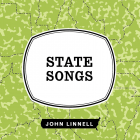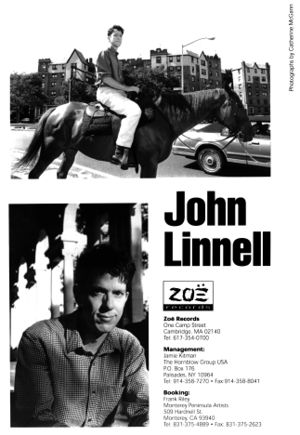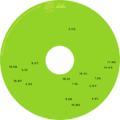State Songs
- For the five-song 1994 Hello Recording Club EP by John Linnell, see State Songs (EP).
 |
Studio album by John Linnell | |||||
| First released | October 26, 1999 Release details / collectors: Show | Hide |
Tracks | 16 | |||
| Label | Rounder / Zoë <01143-1005-2> | Length | 45:10 | |||
State Songs is John Linnell's first and only full-length solo album, released in 1999. It features sixteen songs, most of which are named after U.S. states.
Contents
Purchase[edit]
| Seller | Format | Price | Link |
| Download | 
| ||
|
| |||
| AAC | $9.99 | 
|
Description[edit]
Background[edit]

John Linnell devised the concept and started writing his state songs in the summer of 1988, while working on They Might Be Giants' Lincoln album.[1][2] He was interested in writing songs based on categorized sets of titles. This was an idea he had first explored a few years earlier, when he and John Flansburgh wrote songs for each of the three oceans. Linnell drafted lists of potential song title sets, including U.S. presidents and Planet of the Apes movie titles.[3] He settled on U.S. states, initially planning to write the songs in the style of actual state anthems. In late 1989 he played a solo set of this material at Quiet Life, opening for the band the Maudlins. Linnell stated in a 2000 interview: "Amongst the bunch of songs and ideas for projects that I had laying around at the end of the 1980s it seemed like the State Songs was the appropriate one to snap off for a solo venture."
In mid-1994 Linnell released a five-song State Songs EP through the Hello Recording Club. The EP was recorded in the summer of 1994 at Excello Studios in Brooklyn. They Might Be Giants' live sound man Paul Angelli recorded and mixed the EP, and TMBG's drummer Brian Doherty featured on three tracks. All of the material on this EP would later appear on the full album, in remixed and reworked forms. Linnell performed a short set of songs from this EP at a 1995 Hello Recording Club showcase event. In August 1996 Linnell released his second solo Hello EP, House Of Mayors. Like State Songs, it is a concept EP in which the material is connected by a loose central theme.
In 1998 Rounder Records approached Linnell about releasing a full State Songs album. Rounder was eager to release at least one volume of State Songs, and their interest convinced Linnell to return to the project.[4]
The album was announced in an April 1999 post on They Might Be Giants' website:
LINNELL FINISHING UP "STATE SONGS" RELEASE!
Years in the making, and with much anticipation, Mr. Linnell will be releasing his "State Songs" LP this year. Which states will be included in this first set is undetermined, but it is destined to include Hello material and a host of new tracks. The disc will be released through Rounder, probably in the fall.
Recording[edit]
The album was recorded in 1999, in the breaks between They Might Be Giants projects. Recording took place at various New York studios including Coyote Studio, Kampo Audio, and Linnell's home studio Collyer Brothers Studio. The album was mixed by Pat Dillett and mastered by Paul Angelli. Linnell did most of the engineering work himself,[5] and is the sole credited producer. Almost every song has a different lineup of musicians, most of whom had previously worked with They Might Be Giants. One of the accordions that Linnell used on this album was a miniature Gretsch, which he found at a flea market.[6]
Linnell insists that his state songs are unrelated to the real states that they are named after. He was only interested in using the state names as songwriting tools, describing them as "open-ended nouns that could stand for anything."[7] He explained in 2000: "You might say that the 'states' on the record are of internal places for which the record is a unique map."[8] "Michigan" was the earliest-written song on the album.[9] Linnell spoke further about the album's concept in a 1999 interview on NPR's All Things Considered:
I decided to start writing songs with the name of the states as a way of avoiding having to come up with song titles. I suddenly had fifty song titles and I could write fifty songs based on that. This is always one of my problems with writing lyrics is I'm just so lazy I don't want to have to think up all the words and what the song means exactly. It's just a way to create more music without having to get bogged down in verbal ideas. [...] One other reason I was interested in writing state anthems is because I like the style they usually employ in state anthems. Sort of archaic and kind of square. [...]
I don't think that the songs are liable to be adopted as the state anthems of the actual states, sadly. I was thinking initially that that might be a nice thing, but thinking about it I think songs like 'Oregon is bad' are not likely to go down very well in Oregon."
The album features two models of band organ. The first, a Wurlitzer 103, was owned and operated by Bob Stuhmer. It features on "Illinois" and "Iowa." Stuhmer himself cut the roll that is used to operate the organ, based on music that Linnell sent him. The organ was recorded in Stuhmer's home in Long Island. The second band organ used was a Wurlitzer 165, which was located in Glen Echo Park in Maryland. This organ could produce six notes and featured 256 pipes, a glockenspiel and percussion. It's featured on the songs "Utah" and "New Hampshire." The music rolls were cut by Max Hurley, and the organ was recorded on location. Linnell spoke about recording the organs: "[Stuhmer] was very, very conscientious. I sent him a cassette in addition to the music, and he was very careful about making the music that the band organ played sound as much like the cassette as possible. I think he had a better grip musically on what it was that I was trying to do. There were a lot of mistakes on the other one that I didn't have the resources or the time to correct, so there's just some wrong notes that you hear on the larger carousel organ."[10]
Initially Linnell was interested in writing music for the carousel band organ in New York's Central Park, but the permits were difficult to obtain and the organ could only produce three notes.[11] He explained the use of the band organs in a 1999 Billboard interview:
I had the idea that I could substitute the carousel organ for the usual human rock musicians on some of the numbers I cooked up. I managed to record four of the songs on my album using the sounds of two band organs, later overdubbing vocals and, in one case, more contemporary sounds. The results in some cases were pretty different from what I was expecting, but now that the record is finished, I'm glad I went through with it.
Linnell has confirmed that he has written more state songs that haven't been released. In 1997 he estimated that he had 16 to 20 "more or less complete" state songs.[12] Shortly after the release of the album in 1999 he stated: "I've probably got another 10 or 15 done, and ideas for others." Some of these songs had recorded demos, while others were only partially written.[13] In a 1999 interview Linnell confirmed that a "North Carolina" song existed.[14] In other interviews from 1999 he mentioned a number of states for which he had not completed songs -- these included Massachusetts, New York, Texas, California, Florida and Wisconsin.[15][16] He explained in a 1999 Washington Post interview:
I'm not sure if I've reached my goal yet. I'm having trouble remembering if I've written all the songs. I think maybe the answer is that I've probably written or started writing a song for every state and some of them are not so great. In some cases I've rewritten songs. There were two other songs called "Utah" before I came up with the one that's on the record. I've been writing these songs for 11 years now, so I don't know if it's going to take the rest of my life to finish the whole project. [The songs on the album] were the ones that were the most ready. They formed a nice set together. It's a little bit arbitrary.
Release[edit]
The album was released on October 26, 1999 by Zoë, an imprint of Rounder Records. In November "Montana" was released as a limited edition 12" vinyl single. The single was on green colored vinyl that was die-cut in the shape of the continental United States. It featured the non-album track "Louisiana" on its b-side. Rounder initially wanted "South Carolina" as the single, but it was too long to fit on the irregularly shaped record.[17]
A special limited-edition green vinyl was released for the album's 20th anniversary, as part of the 2019 Record Store Day Black Friday. A digital "Expanded Edition" followed in 2021, which added the b-side "Louisiana" as a bonus track.
The album's cover and package was designed by Barbara Glauber. She had previously designed the covers of Linnell's solo EPs, as well TMBG's Factory Showroom and Mono Puff's Unsupervised and It's Fun To Steal. The album cover is a stylistic imitation of a composition notebook, with its distinctive marbled cover pattern. The album's booklet included real (and fake) facts about each state featured on the album. One page of the booklet is a cryptic set of lines, which is emulating the page of general information typically found at the back of composition books.
In November 1999 Linnell embarked on a State Songs tour. For this he assembled a new band, which was billed as "John Linnell And The Statesmen." The lineup included Dan Miller on guitar, Mark Lerner on bass and Mark Donato on drums and harmonica. All of the band members had appeared on the album. Lerner reflected in 2012: "[Donato and I] were both a little confused as to why Linnell wanted us, since he'd really only heard us as a rhythm section in Flat Old World, a rather non-rock, non-pop project. I was intimidated because even though we were pals, Linnell had played with some pretty serious bassists."[18] Lerner, incidentally, had attended Linnell's 1989 solo State Songs show. The State Songs tour was active in November and December 1999, and again in February and April 2000. The band played a total of 17 shows, including three shows opening for They Might Be Giants. At one Bowery Ballroom show the band played on stage with the Wurlitzer 103 band organ, which Bob Stuhmer operated. On January 7, 2000 the band performed "Montana" live on Late Night with Conan O'Brien.
The album was not enough material for a full hour-long live show, so the band performed a number of covers of other songs named after U.S. states. These live covers included Johnny Horton's "North To Alaska," Bruce Springsteen's "Nebraska," Dead Kennedys' "California Über Alles," Crosby, Stills, Nash & Young's "Ohio" and "Maryland, My Maryland," the real state song of Maryland. The band rehearsed a non-waltz version of "Tennessee Waltz," but is not known to have performed it live. Linnell also performed Wallace Stevens' poem "Anecdote of the Jar," which references the state of Tennessee, at his 1995 State Songs show.
Linnell spoke about the project in a June 1999 New York Times profile on They Might Be Giants:
Mono Puff and State Songs are things we get to do without looking over each other's shoulder. They're what we call 'the Ringo walk,' like the part of the movie A Hard Day's Night where Ringo Starr is walking around by himself, just wrapped up in his own Ringo-ness. They also feed back into what we're doing. We get to define They Might Be Giants better, and it helps our songwriting.
Linnell has been asked about future State Songs releases a few times over the years. He stated in 2007 that he "gave up" up on the project.[19] In mid-2020 John Flansburgh suggested to Linnell that he work on a second volume of State Songs during the COVID-19 pandemic lockdown. Instead he opted to write and record Roman Songs, a four-song EP sung entirely in Latin. Linnell spoke about the future of State Songs in 2021:[20] "I want to say 'never say never.' I just want to do something that's exciting to me, and I sort of wandered off the State Songs project. [...] I think it's good to have the potential to do it, and I absolutely am not saying I'll never do more of those. But I just have to find my way back to it."
Track listing[edit]
| # | Title | Length | Lyrics | Guitar Tab |
|---|---|---|---|---|
| 1 | Illinois | 1:23
|

|

|
| 2 | The Songs Of The 50 States | 2:24
|

|

|
| 3 | West Virginia | 3:32
|

|

|
| 4 | South Carolina | 3:46
|

|

|
| 5 | Idaho | 2:38
|

|

|
| 6 | Montana | 3:14
|

|

|
| 7 | Pennsylvania | 1:02
|

|

|
| 8 | Utah | 2:34
|

|

|
| 9 | Arkansas | 3:27
|

|

|
| 10 | Iowa | 2:54
|

|

|
| 11 | Mississippi | 2:16
|

|

|
| 12 | Maine | 2:07
|

|

|
| 13 | Oregon | 1:49
|

|

|
| 14 | Michigan | 1:14
|

|

|
| 15 | New Hampshire | 2:50
|

|

|
| 16 | Nevada | 7:58
|

|

|
Expanded Edition Bonus Track[edit]
Digital-only bonus track released for download/streaming in 2021, previously only available on the vinyl Montana single.
| # | Title | Length | Lyrics | Guitar Tab |
|---|---|---|---|---|
| 17 | Louisiana | 2:59
|

|

|
Gallery[edit]
State songs advert from No! CD booklet
